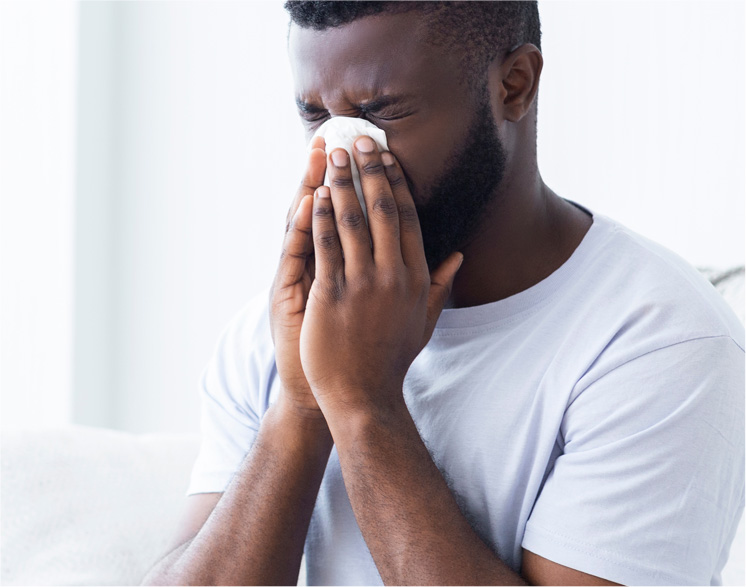Effective Allergy Care in Cumming, GA
What are allergies? A damaging immune response by the body to a substance.
At Russell Medical in Cumming, GA, our allergy doctors understand the complexities of allergies and their impact on daily life. The human body’s immune system is a remarkable defense mechanism against harmful invaders like viruses and bacteria. However, for some individuals, the immune system can become overly reactive, misidentifying harmless substances such as dust, grass, pollen, and pet hair as dangerous threats. When this happens, the immune system launches a barrage of chemical reactions to combat these perceived enemies, leading to unpleasant and sometimes life-threatening symptoms.
Our experienced team of medical doctors and allergy doctors at Russell Medical specialize in allergy testing and effective allergy treatment, providing solutions to alleviate allergy symptoms and improve overall well-being. Through advanced diagnostic procedures, our medical and allergy doctors identify the specific allergens triggering your symptoms, enabling us to create personalized allergy treatment plan tailored to your unique needs.
Contact our allergy doctors today to see how we can bring an end to your allergy suffering.
How do I know if I am having an allergic reaction?
Medical Doctor Cumming, GA
If you’re unsure whether you’re experiencing an allergic reaction, it’s essential to recognize the symptoms. Allergic reactions can manifest in various parts of the body, often leading to common cold and flu-like symptoms such as a runny nose, sneezing, sinus congestion, itchy or watery eyes, post-nasal drip, sore throat, and cough. Additionally, you might notice skin-related issues like rashes or upset stomach, as well as respiratory problems like wheezing or shortness of breath. At Russell Medical in Cumming, GA, our team of dedicated allergy and medical doctors is here to provide expert sick care and alleviate any discomfort caused by allergies. If you experience these symptoms or suspect an allergic reaction, don’t hesitate to seek the support and guidance of our qualified cold and flu doctors to ensure your well-being.

What substances cause allergic reactions?
At Russell Medical in Cumming, GA, our team of experienced medical doctors and allergy doctors understands the complexities of allergic reactions and the vast array of substances that can trigger them. These substances, known as “allergens,” come in countless forms, with hundreds of ordinary elements capable of eliciting allergic responses. Some of the most prevalent allergens include plant pollens, household dust with dust mites, animal dander, feathers, insect stings, as well as certain foods and medicines. We are dedicated to providing comprehensive sick care and specialized guidance to help you identify and manage allergic triggers, ensuring your well-being and comfort in dealing with these potential allergens.
How do I get tested for allergies?
Medical Doctor Cumming, GA
At Russell Medical in Cumming, GA, our expert team of medical doctors and allergy doctors is committed to providing comprehensive sick care, including allergy testing to identify potential triggers. When it comes to testing for environmental allergies, we offer the most rapid, sensitive, and cost-effective method: skin testing. This procedure typically lasts less than an hour and involves minimal patient discomfort. However, we understand that individual circumstances may vary, and in cases where a skin condition or medication makes skin testing impractical, we also provide blood tests as an alternative option. Rest assured, we tailor our approach to suit your specific needs, ensuring accurate and efficient allergy testing to help you manage your allergies effectively and improve your overall well-being.

What treatment options are available?
Medical Doctor Cumming, GA
Our skilled medical doctors and allergy doctors at Russell Medical in Cumming, GA offer a range of treatment options to address allergies and improve your overall sick care. While allergen avoidance is the best preventive measure, it may not always be practical. For patients with significant allergies, pharmacotherapy with over-the-counter antihistamines is often the first line of defense. However, in some cases, these medications may not provide adequate relief or may come with intolerable side effects, necessitating the use of prescription medications. For those seeking more long-term relief, subcutaneous immunotherapy, commonly known as allergy shots, can be a game-changer in enhancing a patient’s quality of life. Although allergy shots are not a quick fix, many individuals find them to be well worth the time and effort, providing sustained relief from allergy symptoms. At Russell Medical, we strive to tailor our treatment plans to meet your specific needs, ensuring you receive the most effective and personalized care to manage your allergies successfully.

How do allergy shots work?
At Russell Medical in Cumming, GA, our expert medical doctors and allergy doctors offer allergy shots as an effective method to address allergic reactions and provide comprehensive sick care. Allergy shots work by desensitizing your immune system to the various environmental triggers, such as trees, grasses, dust, and dander, that cause unpleasant allergic reactions. Through this process, we aim to alleviate symptoms like sinus trouble, eczema, asthma, and other issues exacerbated by allergies, leading to significant relief for patients. Not only do these shots provide relief from immediate symptoms, but they also contribute to a stronger and healthier immune system in the long run. By personalizing the treatment and considering your specific needs, we aim to enhance your quality of life and ensure that you receive the best possible care in managing your allergies effectively.
Contact our team of medical doctors today to see how we can bring an end to your allergy suffering.
Open M-F 8AM-6PM
Closed for Lunch from 12PM-1PM

